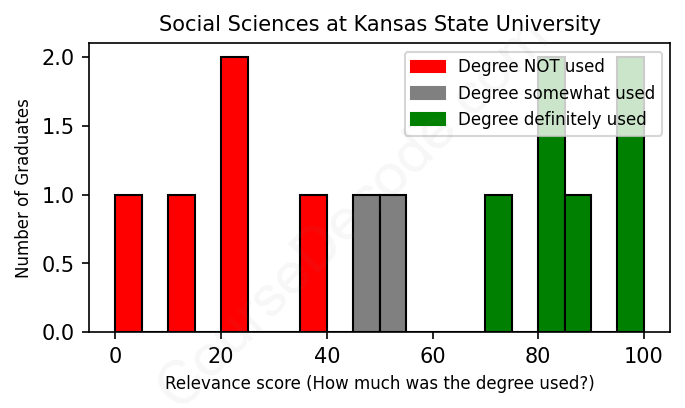
First, some facts. Of the Social Sciences graduates from Kansas State University we've analyzed , here's how many have used (or NOT used) their degree in their career:

These are estimates based on AI analysis of 13 LinkedIn profiles (see below).
The verdict? Significantly below average. Overall, with an average relevance score of 54%, Social Sciences graduates from Kansas State University have a much lower likelihood (-13%) of finding work in this field compared to the average graduate across all fields:
And for comparison, here's the chart for all profiles we've looked at across all degrees.
Also, after graduating, only 30% of these graduates have pursued further education other than another Bachelor's degree (such as a Masters degree or other), compared to the average across all profiles of 35%. This suggests a Bachelors degree is enough for most Social Sciences graduates, and it's normal to look for work straight after graduation.
See the details:
|
Relevance score: 82% We think this person has gone into a career highly relevant to their degree. We think this person has gone into a career highly relevant to their degree.
DEGREE INFOGraduated in 2015 from Kansas State University with a Bachelor of Science (B.S.) in Social Sciences. No other secondary education since. JOB HISTORY SINCE GRADUATIONBusiness Development Intern RTS Carrier Services Jun 2015 - Aug 2015 Account Relationship Manager  RTS Carrier Services Jan 2016 - Nov 2018 Delivery Consultant  Netsmart Nov 2018 - Jan 2020 Client Representative  Netsmart Jan 2020 - Apr 2020 Client Alignment Representative  Netsmart Apr 2020 - Apr 2021 Client Alignment Executive  Netsmart Apr 2021 - Jun 2022 Client Success Manager  Netsmart May 2022 - Present ABOUTAccomplished Sales professional with demonstrated ability to consistently achieve Customer Service goals. Proven record of generating new business through strategic negotiation while cultivating new relationships with key decision-makers. Adept at effectively developing business plans and strategies in alignment with corporate goals, objectives, and values for the client. Outstanding written/verbal communication skills; able to develop and maintain positive relationships across all levels within an organization including executives, managers, colleagues, and clientele |
The top 10 most common jobs done by the graduates we've analyzed (ranked most common to least) are:
From the data I've gathered, it seems like many graduates from Kansas State University's Social Sciences program have landed in a mix of positions, but a significant number don't directly relate back to their degree. The more common roles include sales and customer relations positions—like Account Managers, Delivery Drivers, and Relationship Advisors—where interpersonal skills are essential. While some of these jobs might benefit from a background in social sciences (like understanding human behavior and communication dynamics), they aren't primarily focused on the core principles of the field.
On the flip side, there are a few roles that truly utilize the skills learned in a social sciences program, such as Social Service Workers and Client Success Managers, where knowledge of human behavior, social theories, and community needs can make a big difference. Overall, it appears that while the social sciences background occasionally comes in handy, many graduates find themselves in jobs that don’t make direct use of their degree. So, if you're thinking about studying social sciences, it's worth considering how you might want to apply that knowledge in the workforce—or if you might end up in a completely different field!
Here is a visual representation of the most common words in job titles for Social Sciences graduates (this is across all Social Sciences graduates we've analyzed, not just those who went to Kansas State University):

The career trajectories of Social Sciences graduates from Kansas State University paint a mixed picture. Right after graduation, many alumni seem to take on entry-level roles across a variety of fields. For instance, some started in positions like social service workers or account managers, while others ventured into roles unrelated to their degree, like drivers or sales representatives. It appears that many people may have taken jobs that don’t directly connect to Social Sciences, especially early on in their careers. This suggests that while these individuals have valuable skills, some might not be using them in their first jobs post-graduation.
However, as time goes on—especially five to ten years after graduating—there is a noticeable trend of movement into more specialized roles that align better with their degrees. Some graduates found their way back to relevant positions in social services, psychology, or research roles. Others transitioned into industries related to technology and data, which are increasingly important today. So, while the first job may not always be a slam dunk in terms of relevance, many seem to find their paths back to fields that exploit the strengths they developed during their studies. Overall, it looks like these graduates experience a bit of wandering initially, but many do find their niches over time, reflecting a combination of resilience and adaptability.
Honestly, a Bachelor’s degree in Social Sciences, like the one at Kansas State University, tends to be on the more manageable side compared to some of the more technical or science-heavy majors. You can expect to dive into a variety of topics like sociology, psychology, and anthropology, which can be super interesting and relatable. The workload usually involves a lot of reading, writing papers, and participating in discussions, but if you're organized and stay on top of your assignments, you should be fine. It’s definitely more about critical thinking and understanding theories than cramming for exams, so if you enjoy engaging with social issues and working with concepts, it’ll probably feel a bit easier than some of the tougher degree paths.
Most commonly, in the LinkedIn profiles we've looked at, it takes people 5 years to finish a Bachelor degree in Social Sciences.
Looking at the job histories of these Kansas State University graduates, it seems like their earnings might vary quite a bit depending on their specific roles and industries. For example, the folks who moved into tech or specialized positions, like the Cloud Architect or the Policy Analysts, likely pulled in decent salaries, especially over time as they gained experience. Meanwhile, others, particularly in fields like social services or hospitality, may not have seen salaries that are as high or stable. Those delivery driver roles and customer service gigs don’t usually pay too well, so some graduates might still be earning modest incomes. Overall, it seems like a mixed bag – some are probably doing pretty well, while others might be scraping by.
Here is a visual representation of the most common words seen in the "about" section of LinkedIn profiles who have a Bachelor degree in Social Sciences (this is across all Social Sciences graduates we've analyzed, not just those who went to Kansas State University). This may or may not be useful:

Here are all colleges offering a Bachelor degree in Social Sciences (ordered by the average relevance score of their Social Sciences graduates, best to worst) where we have analyzed at least 10 of their graduates:
| College | Score | Count |
|---|---|---|
 Portland State University Portland State University
|
72 | 27 |
 University of Maryland University College University of Maryland University College
|
63 | 10 |
 Kansas State University Kansas State University
|
54 | 13 |
 Washington State University Washington State University
|
53 | 11 |
 Ashford University Ashford University
|
51 | 27 |
 Florida State University Florida State University
|
49 | 11 |